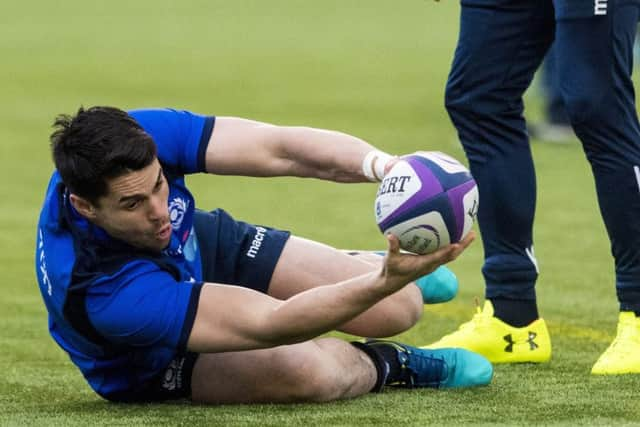Sean Maitland set to start but '˜chilled' when he's on bench
The modern game has rendered the term “replacement” another quaint anachronism as the role of the benchmen has been well and truly substituted.
For younger readers it may come as a surprise to learn there was a time when there were no replacements in rugby union. An injury was as good as a red card. The legendary Irish centre Mike Gibson became the first official player to be used as a replacement in an international match when Barry John broke his collarbone in the Lions’ first Test against South Africa in 1968 after the laws were changed.
Advertisement
Hide AdAdvertisement
Hide AdTactical substitutions wouldn’t be introduced, officially, for another 29 years – after the watershed of professionalism,


You think of players such as Greig Oliver, the former Hawick scrum-half, who had the joint misfortune of being at the peak of his powers when substitutions were for injuries only and also when the great Gary Armstrong was playing.
Jim Telfer famously described the Jed-Forest No 9 as “the bravest man I have ever seen play for Scotland” and, as a result, Oliver was left to witness much of Scotland’s golden period of the late 1980s and early 1990s, including the famous Grand Slam game, from the sidelines.
Oliver has the quirky fact that his two starts for Scotland both came against Zimbabwe, in the World Cups of 1987 and 1991. His third cap did come as a replacement for Armstrong on the 1990 tour of New Zealand.
In the modern age, Oliver, pictured below right, would surely have amassed at least ten times that number as the use of substitutions has significantly altered the sport.


England coach Eddie Jones refers to the bench as his “finishers” and the professional era has become a 23 v 23 contest, with many traditionalists feeling that the inevitable second-half churn of substitutions dilutes the game from its purest form and creates a vicious cycle of physical intensity.
Versatility also becomes curse as some players are viewed as being of more benefit on the bench to cover a number of scenarios and Sean Maitland finds himself in that category.
The wing/full-back is expected to return to the Scotland starting line-up in place of the injured Byron McGuigan against France on Sunday but the Saracens man confessed that he enjoys being a sub, despite only three of his 30 Scotland caps coming from the bench.
Advertisement
Hide AdAdvertisement
Hide AdThat said, he would prefer to enter the fray in better circumstances than he encountered in Cardiff.
“The team comes first and you want to be starting. It is competition for places and healthy for the squad. For me, covering full-back helps as well,” said Maitland.
“It is a skill to be on the bench, coming on, especially when you are chasing the game. For me, I just like to be chilled and I relax a bit more on the bench and don’t get too over-hyped about things.
“Obviously at the weekend it was a different scenario and we were down so many points and you just want to come on and try to make an impact.
“There was a lot of frustration and the body language was down a bit when I came on. It is one of those things. The boys this weekend want to put things right.
“It is very important playing at home we get the win. You try to bring energy when you come on, and I am trying to bring a lot of energy to how we train and the environment. Whoever is selected this week I hope to bring energy.”
Maitland insists he wasn’t put out to be relegated to the bench for the Sale newcomer McGuigan, who suffered a hamstring injury in what was his third cap for Scotland.
“I wasn’t disappointed,” e said Maitland. “When you’re in the team you want to be have competition and, over the last few years, there has always been competition in the back three with me, Tommy [Seymour], Viss [Tim Visser] and now Byron has come on the scene.
Advertisement
Hide AdAdvertisement
Hide Ad“He was absolutely class in the Australia game and that’s what [coach] Gregor [Townsend] said, he deserved another chance. It’s a shame what happened to Byron with his hamstring, but there’s still a lot more competition with Lee Jones, who played really well against the All Blacks. You need that to drive yourself.
“Obviously working under Gregor for three seasons [at Glasgow between 2012 and 2015] I knew how he wanted to coach, what his traits were.
“I’m always striving to get better and competition helps that.”
Scotland had four games against France in the Vern Cotter era, a memorable home win at home two years ago and three tight battles in Paris which could have gone either way, with Maitland featuring in the first and last of those.
“It did help,” said Maitland of now Montpellier coach Cotter’s vast experience of French rugby. “Physically it is a massive game. You have to match them up front, the forwards in particular have been working hard to prepare for it.
“They [France] have had a bit of a transitional phase as well. Their team in the last two years hasn’t been consistent. Looking at the footage, looking at club rugby as well, they’re full of exciting players.”